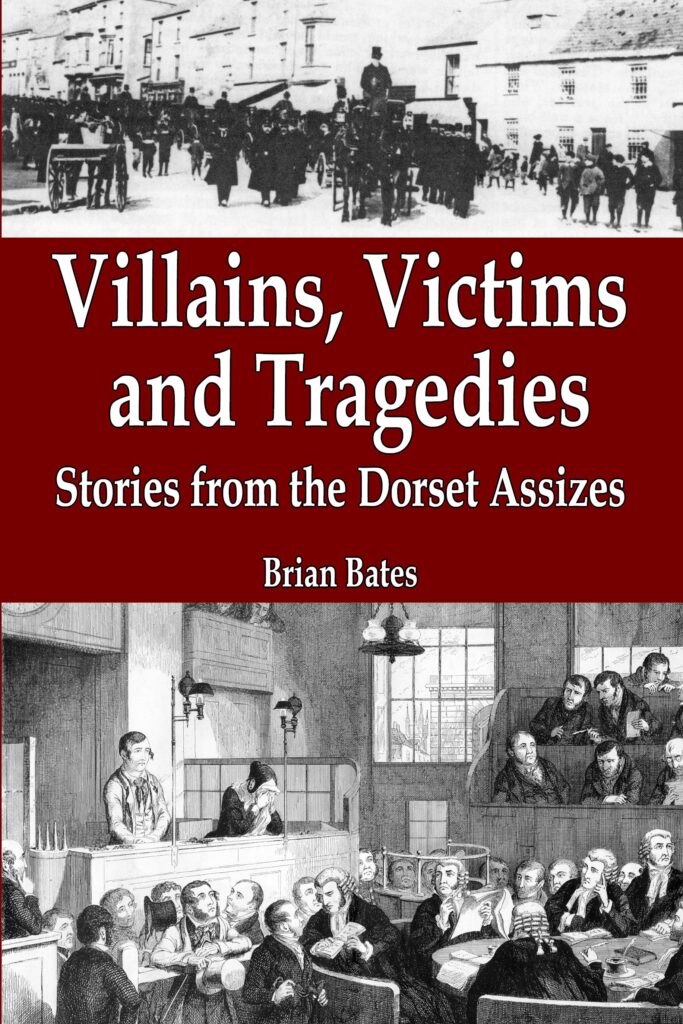A new book by Brian Bates tells about some of the dramas, tragedies and even comedies that played out at the Dorset assize courts during the nineteenth century…

At the Lent assizes, in 1856, 15-year-old servant Flora Everitt stood in the dock accused of trying to poison her master, and in that same year Elizabeth Martha Brown was tried and hanged for killing her husband with a hatchet. In 1818 James Bowditch stood accused of abducting a 16-year- old heiress, and in 1841 widow Jane Winter sued sea captain James Butt for breach of promise, after she became pregnant and he disappeared to London. Such was the diversity of cases heard in Dorchester, but most had one thing in common, and that was tragedy, whether the principal actors were of the lowest social orders or landed gentry. Tragedy not just for the convicted, who faced imprisonment, transportation to the other side of the world, or death, but also for their families, many of whom were confronted by poverty and the workhouse.
Collectively, the stories paint a fascinating picture, not just of nineteenth century crime, but also of the prevailing attitudes to what was acceptable behaviour, what punishments were appropriate, and the rights of the accused. In their address to the Grand Jury Judges freely gave their opinions on the state of society and newspapers were quick to comment on what they saw as incorrect verdicts or sentences. The judicial decisions of the courts and the debate that arose from them sometimes led to major changes in thinking and government policy.
The introduction part of the book describes the broader judicial system of the time and in particular how it worked in Dorchester, showing how, before the coming of the railway to the town, the judges’ entourage was met at Yellowham Hill by the High Sheriff and proceeded into the town with great pomp, trumpeters playing fanfares and the bells of St Peter’s church ringing out a welcome. This circus occurred twice a year over centuries, and never failed to bring out local folk to witness the importance and power of the law. But, of course, it was inside the Shire Hall that the dramas took place, all ably recorded by reporters present in the court. Dramas like the one which occurred when Edwin Preedy, who had killed a prison warder at Portland prison, tried jump from the dock and had to be strapped down before the court could proceed. Such events were witnessed by a full public gallery which regarded the assizes as a place of entertainment.
The book is based largely on contemporary newspaper reports. They are factual, usually without comment and particularly with the more interesting and spectacular cases, very detailed. I also made use of the extensive Dorchester prison records held by the History Centre and available on the Ancestry website. Although internet sites need to be used with care there are some excellent ones, especially those that have academic articles and books on all kinds of topics. Also online, are the records of national and local archives, like those of Australia and New South Wales, which provided excellent information on convicts punished to transportation.
—
Villains, Victims and Tragedies was written to raise funds for the Dorset Women’s Refuge. It costs £10 and can be ordered direct from Brian. Contact brianbates@trayfoot.co.uk or telephone him on 01305 263824. It is also available on Amazon.


Hello
I have been directed to your site by a friend. I have recently moved to this part of Dorset and I would be very interested in buying your book. Can you tell me how I can do this?
Many thanks
Wendy Bone
It’s ok I’ve just seen the information I need.kind regards
There was a special train that ran from Bridport on Saturday 6 March 1858 “to Dorchester for the Assize Court”.
What would the case have been that attracted a trainload of people from Bridport? I would love to know